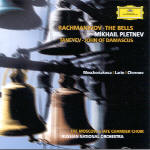This is a curious reading of The Bells. Mikhail Pletnev seems more attuned to the mystical and profound aspects of Edgar Allen Poe’s tome than to the celebratory ones. Thus, the first movement delights rather than excites. Tenor Sergei Larin’s exceptionally long-held “Slisis” creates an expectancy that is unfulfilled by the tepid-sounding chorus. How differently and much more thrillingly this passage is rendered by the Russian Republican Capelle under Kiril Kondrashin on his classic Melodiya recording (now available on RCA). There we have a full, robust, and richly Slavic sound that is only hinted at by Pletnev’s Moscow State Chamber Choir, an ensemble that just doesn’t have the requisite heft for this very Russian work (one that benefits greatly from the solidity and gruffness of Kondrashin’s group).
Pletnev himself doesn’t help matters with his rather straightforward and unimaginative phrasing, as well as the limited dynamic range of his performance (this in comparison to Kondrashin’s compressed and sometimes harsh-sounding Melodiya recording). In the second movement, the Russian National Orchestra’s strings render their passionate rising chromatic passage without a hint of eros, making this wedding ceremony an especially chaste affair. Marina Mescheriakova sings beautifully but without the conviction of Kondrashin’s or Ashkenazy’s soprano soloists. Pletnev’s third movement comes off in a frustratingly enervated manner, and this is supposed to be about alarm bells! The finale benefits from baritone Vladimir Chernov’s powerful tones and convincing declamation, while everyone else is just a bit too comfortable. (Yes, it’s hard to beat a classic, but you should at least try.)
The disc is partially redeemed by the inclusion of Taneyev’s John of Damascus. In this work, premiered in 1884, Taneyev successfully fused Bachian counterpoint with Russian folk and liturgical music. The main theme, which reappears throughout all three movements, has a beautiful solemnity–and sounds similar to a melody in the finale of Gliere’s Symphony No. 3. Pletnev and his forces are far more convincing in this comparatively traditional and conservative work, bringing to it much devotional spirit and dynamic intensity. Deutsche Grammophon’s recording captures all the participants in reasonably wide-ranging sound that still isn’t state of the art in terms of clarity or detail.
































